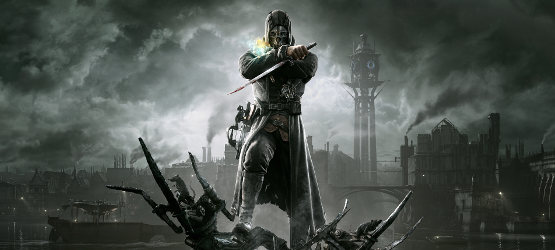In an alternate universe, some time around the 17th century, chaos is brewing. The plague is ravaging the population, leaving what’s left of humanity fighting for control. When all is lost, another catastrophe strikes—the Empress is slain, assassinated as part of a plot laid forth by her own Court. Sworn protector and bodyguard of the Empress, Corvo Attano, is framed for the murder, and an attempt is made on his life, too… And this is just the first five minutes of Dishonored, painting a bleak picture of turmoil, corruption, and famine.
Things aren’t always what they seem in Dishonored. Friends are never actually friends. Deception and choice are ever prominent themes throughout Corvo’s journey. The path in front of you may not be the right path to take, and not exploring all available options could very well get you killed. Most times, there are handful of different paths to take to reach an objective. The right one for you depends on how you want to play the game.
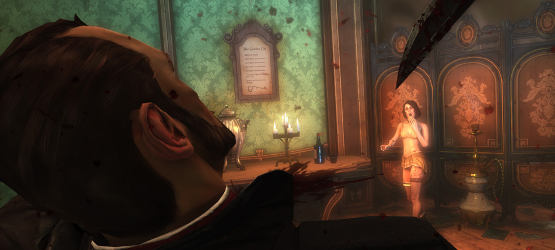
The path of light and forgiveness requires full usage of Corvo’s supernatural powers, patience, and a stealthy, more aware approach. This suits Corvo in his role as a bodyguard and protector. But at the same time, Corvo is also an assassin and a spy, so a path of darkness and death can be followed, killing and murdering everyone that dares stand in his way. Both options are equally enjoyable for their own reasons, and to fully experience all that Dishonored has to offer, you must play each.
The light path is more difficult, since if you get spotted at all, guards strewn all over the fictional city of Dunwall will attack you. They will actively hunt you, and they will kill you if they find you… unless you kill them, then there goes all of your stealthy efforts, along with your chance to finish the game with a low level of Chaos—the game’s own internal measurement of how your actions affect the world of Dishonored.
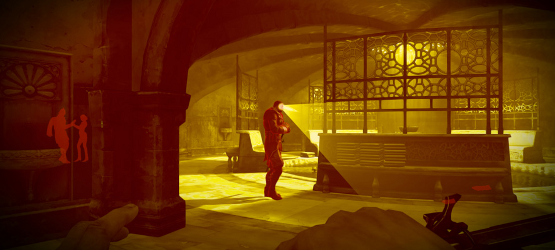
Staying hidden isn’t easy, despite many different path choices and a variety of supernatural powers at Corvo’s disposal. He can “Blink”, a sort of dash-teleport that let’s him escape or traverse in haste. Dark Vision is a must—Dishonored‘s play on Batman: Arkham City‘s detective mode—to spot enemies lurking behind walls, or to keep an eye on the areas a guard patrols. Corvo can Bend Time itself, using it to a number of advantages, and even posses other humans, hounds, or rats to sneak through tiny grates on the ground and access otherwise unreachable areas.
The path of darkness isn’t a simple one, either. In the later areas of the game, enemies are plentiful, powerful, and cunning. Swordplay and Corvo’s weaponry that includes grenades, traps, a crossbow, and a pistol, are extremely satisfying to use, but can bring about grave consequences. The evil brought about from all of the death and killing further twists an already demented world, turning allies against you, increasing the number of disease-spreading rats and corpses, even shaping others into more sinister versions of themselves.
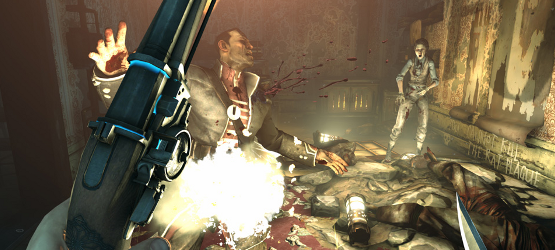
Of course, a mix of both paths is also an option, possibly even the best way to experience Dishonored for the first time. But depending on where your level of chaos lie at the end of the game, you only get a certain outcome. This keeps replay value high, and it may even take multiple tries—plus plenty of patience—to finish the game as Ghost, undetected, or without killing a single person. Dishonored‘s greatest achievement is the sheer amount of choice granted to players, providing many decisions to be made as to who you should kill or spare, or which way you should approach a situation or objective. And no way is “wrong”, so to speak.
The world is also packed with hidden items—some for collecting purposes, and some that are infinitely more useful—for you to uncover. Not only does the exploration necessary to discover these items provide an enjoyable diversion, but doing so also bolsters your abilities. Runes, for example, are needed to unlock more supernatural abilities. Bone Charms are seemingly random ability boosters, such as making potions more effective. These can be located by using the Heart—easily my favorite touch to the game—as a guide to find them. Seeing the gears begin to turn and glow inside the window in this mechanical heart is a touch of both finesse and intricate detail that’s found throughout Dishonored.
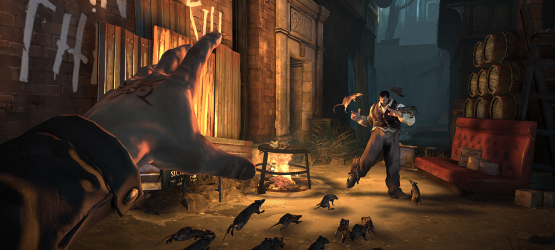
Dishonored‘s combination of special supernatural abilities and (mostly) unique set of weaponry are also a major plus, giving plenty of ways to complete your task, take out enemies, and keep the game feeling unlike anything else released in the calendar year. It does, however, borrow successful mechanics ushered in by other games, but it does so in a way that allows Dishonored to have its own identity.
Through exploration, the multiple pathways and a number of possible scenarios and outcomes, Dishonored packs in plenty of reasons to go back to it, despite not having any multiplayer modes. A playthrough ignoring all hidden items and stealth, opting for a murderous rampage can finish in around five hours. Whereas staying in the shadows and collecting every item could last more than 20 hours to be completely careful and remain undetected. It’s all in how you play the game, the choices you make, and the paths you take. In my mix of both stealth and slaughter, it took me closer to 11 hours, exploring almost every nook and cranny of Dishonored, still missing a few items and power ups. And when as soon as I finished, began plotting my next playthrough—Dishonored is just that good.
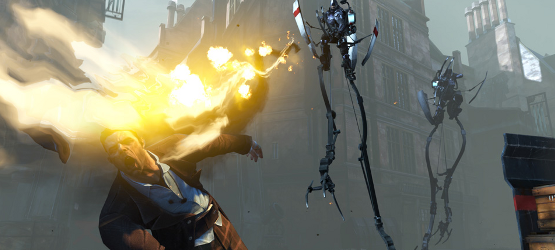
It’s not the prettiest game I’ve had the pleasure of laying my eyes on, but the amid the towering structures and darkest depths of the industrial city of Dunwall, lies character that most games cannot touch. Despite being completely fictional, the world is believable, warping you to a time of utter chaos. There’s not even one boss fight to be found—strange almost, but proves that the biggest challenges can come from the decisions you must make.
Dishonored may not do anything we’ve never before seen, but everything it does, it does extremely well. The massive amount of choice given to players keeps the game interesting through multiple replays, proving that multiplayer isn’t necessary to be a hit. In a year, and an industry, stricken with a plague known as “sequelitis”, Dishonored is the perfect cure, and should etch its name into every Game of the Year discussion with a sharply-tipped assassin blade.
-
So many choices, so many paths
-
Dunwall is quite charming, despite death, plague, and corruption
-
Supernatural abilities are a joy to toy with
-
Plenty of explore, and reason to do so.
-
Strong replay value without multiplayer
-
Graphics don't quite hit the mark
-
Tough to stay undetected, which can force you on a dark path
